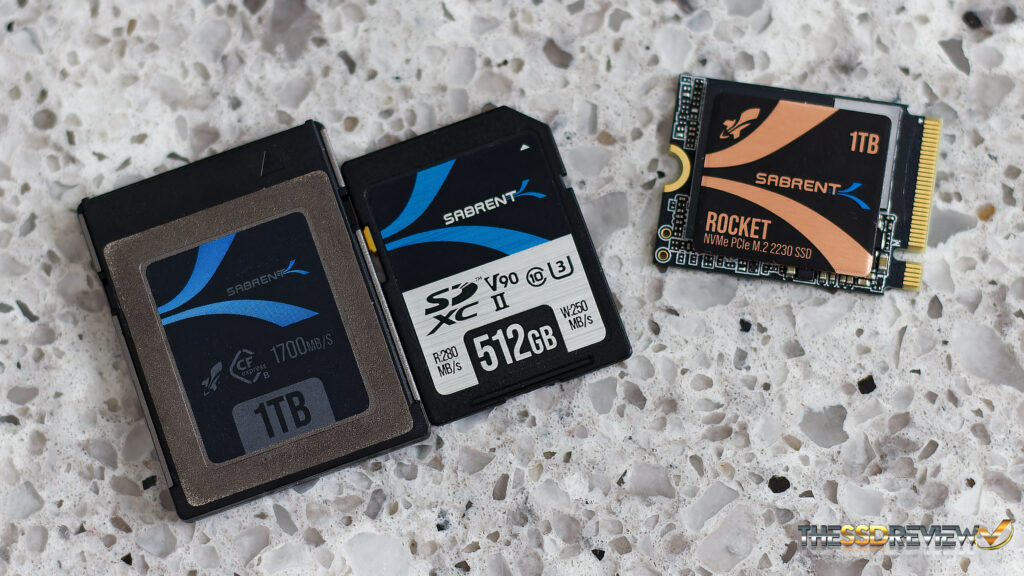The theme of the day with respect to solid state storage seems to be form factor; the smaller the better. A smaller footprint SSD becomes possible as the flash industry introduces newer NAND flash memory capable of higher capacities in each memory chip. The hot ticket on today’s menu is without a doubt the M.2 form factor 2230 SSD. By 2230 we mean 22mm wide by 30mm long. This is a single controller chip and single NAND flash memory chip DRAMless combination that is smaller and faster than even the best SD card on the market. In fact, the same could be said of its comparison to the speedier CFExpress Type B card as well.

Would you believe that Sabrent Rocket 4 2230 1TB SSD on the right side is a PCIe 4.0 NVMe SSD capable of speeds up to 5GB/s and no cooling is necessary? We can confirm just that as we have finished testing this SSD with our full regimen of benchmarks and no heatsink whatsoever, although we might suggest having the heatsink if it is available. Just think of the possibilities. Steam Deck owners have gone viral looking for this exact solution to their speed and storage needs. So many possibilities. Microsoft Surface, NUC, compact HTPC, ultrabooks. Actually, couldn’t we see this idea expanding to integrated 2230 SSD powered motherboards? Ok… maybe I am getting a bit ahead of myself as I am sure there are several manufacturers that wouldn’t appreciate that last thought.

Nevertheless, Sabrent sent along three of their newest Rocket NVMe 4.0 2230 form factor SSDs to check out and we did just a bit of testing to see where these fit in with the ‘test group’ so far. As per Sabrent’s normal presentation, these are shipped in a very small black cardboard exterior package with the SSD itself protected in a gold aluminum clam-shell design case.

The Sabrent Rocket 4 2230 is available in 256GB, 512GB and 1TB capacities and all are PCIe 4.0 x4 (4-channel) NVMe SSDs that use the NVMe 1.4 protocol. They are TRIM capable and measure 30mm x 22mm x 2.15mm. This is a DRAMless SSD with Host Memory Buffer (HMB) support which means that available system memory takes the place of otherwise normal DRAM memory chips to speed up the SSDs throughput. These specs below provide a complete overview of the drive:

Taking a closer look, we can see that this SSD contains the Phison 12nm PS5021-E21 4-channel DRAMless NVMe SSD controller which runs at 1600MT/s, along with a single chip of Microns best 176-layer 3D TLC B47R NAND flash memory.

It is a single sided SSD with up to a 5-year warranty when one completes their Sabrent product registration and it speaks to a lifespan of 200TBW for the 256GB, 300TBW for the 512GB and 600TBW for the 1TB capacity. The Sabrent Rocket 4 2230 is very power efficient with their 1TB version coming in at only 4150mW read and 4300mW write.

Checking Amazon, we can see initial pricing for the Rocket 4 2230 to be set at $49.99 (256GB), $89.99 (512GB) and $149.99 for the 1TB capacity which seems to be an excellent price for a new release very niche product. Unfortunately, they were all sold out at the time of this report.
 The SSD Review The Worlds Dedicated SSD Education and Review Resource |
The SSD Review The Worlds Dedicated SSD Education and Review Resource | 
“Would you believe that Sabrent Rocket 4 2230 1TB SSD on the right side is a PCIe 4.0 NVMe SSD capable of speeds up to 5GB/s and no cooling is necessary?”
Now, that is hard to believe when your Crystal Disk Info bench shows an idle temperature of 53 degree Centigrade…!
That is not the idle temperature, but rather, the highest temp we could push the SSD to in our testing. This is a bad habit formed from CFExpress testing where temps are so important.
“…is AS SSD as it relies solely on incompressible data samples when testing performance…” – wrong, due to a bug, AS-SSD has about 20-25% compressible portion, therefore Phison-Controller-based SSDs should be tested with AT LEAST 3GB Testfile-size setting.